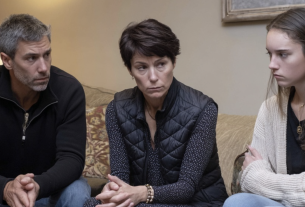“Did you put salt in it? Mom says you mustn’t add any salt at all for children under one, it affects their kidneys.”
Irina didn’t even turn her head. Her hand, holding the small spoon, froze halfway to the mouth of her son, sitting in the high chair. Silently, she returned the spoon to the bowl, scooped up some porridge again and brought it to Artyom’s lips. Slava, standing behind her, snorted disapprovingly but said nothing. The morning was saturated with silence, thick and sticky, like last night’s spilled liqueur on the parquet floor. It hadn’t begun today. It had begun the previous evening, when, in front of their friends, tipsy from two glasses of wine, Slava had clapped her on the shoulder and cheerfully announced to the whole kitchen, “Ira’s a so-so mother, my mom has to explain a lot of things to her.”
The laughter at the table had stuck in everyone’s throat. And he hadn’t even noticed. He’d looked at her with shining, foolish eyes, expecting her to play along with his clumsy joke. She’d stayed silent then. Just got up and began quietly clearing the table, making it clear the evening was over. And now that silence had flowed into the morning, turning from hurt into something solid and cold, like a block of ice in her chest.
Every movement she made was precise, deliberate, like a sapper’s. Not a single extra sound, not a single accidental gesture. She was entirely focused on the child, who was happily gobbling up his porridge, unaware of the storm front hanging over the apartment. For him, the world consisted of Mom, tasty food, and the bright rattle clutched in his fist. Irina was his world. And someone was constantly trying to question that world, criticize it, reshape it according to someone else’s pattern.
“Ira, I’m talking to you. Are you ignoring me again? Mom doesn’t just say these things, you know, she raised two kids. She knows,” Slava finally snapped. He needed to fill this emptiness with the sound of his own voice, his righteousness, the authority of his mother. Her calmness, her detachment, infuriated him — as if he wasn’t her husband, but a piece of furniture you could simply walk around.
The spoon lowered with a quiet clink to the bottom of the bowl. Irina slowly got up, walked around the high chair and stopped right in front of him. She was a head shorter than he was, but at that moment she was looking down on him. Her eyes, usually warm and brown, now resembled two dark, smooth stones.
Her voice did not break into a shout; it dropped lower, denser, as if all the air had been taken out of it, leaving only metal.
“If I hear you call me a bad mother one more time, I’ll pack your bag and send you to your mommy. We’ll see how fast you run from her when she starts lecturing you about life twenty-four seven.”
She didn’t raise her voice, but every word hit him like a stone thrown straight in the face. This wasn’t hysteria. It was an ultimatum. Cold, measured, and final. Slava was stunned. He opened his mouth to argue, to say she’d lost her mind, that he was only worrying about their son—but found nothing to say. He was used to her resentments, to short flashes of anger that faded as quickly as they flared. But this was something else. This was a declaration of war.
Irina didn’t wait for his answer. She turned away, took a wet wipe and began carefully wiping Artyom’s mouth and cheeks smeared with porridge. As if nothing had happened. As if she hadn’t just drawn a line that could not be crossed. Slava stayed standing in the middle of the kitchen, deafened not by shouting but by that icy, lethal phrase. He stared resentfully at her back, and when she finished with their son, she took him out of the high chair, lifted him into her arms and, holding him close, carried him into the other room. Before disappearing in the doorway, she threw over her shoulder, in an ordinary, even tone:
“Wash your cup. And his bowl too.”
The day slowly sank into a gray November haze, but the ice between them never melted. After the morning ultimatum, Slava sulked and barricaded himself on the couch. He didn’t speak to her. He ostentatiously flicked through channels loudly, sighed like a man bearing the weight of the world on his shoulders, and from time to time cast reproachful glances in her direction. He waited. Waited for her to cool down, realize she was wrong, maybe even apologize for her “hysteria.” In his world, that was the only possible scenario. Wives get offended, husbands patiently wait. Then everything goes back to normal.
But Irina wasn’t cooling down. There was no fire in her that could burn out. The morning fury had burned away completely, leaving only a cold, clear emptiness and a crystalline clarity of purpose. She moved through the apartment quietly but confidently, like a surgeon in an operating room. She fed her son, put him down for his first nap, loaded the washing machine, emptied the dishwasher. Every action was mechanical and precise, and that automatic calm terrified Slava far more than any shouting. He felt he’d become a stranger to her, transparent. She looked through him, thinking about something of her own, and he instinctively understood that he wouldn’t like those thoughts.
Closer to lunchtime, when Artyom woke up, she heard it. A faint, dry cough. Once, then again. It wasn’t the sound that makes a panicked mother grab the phone and call an ambulance. It was nothing, a herald of a mild cold that in another child might have gone unnoticed. But Irina froze. She looked at her son, then her gaze slowly shifted to Slava, who was enthusiastically scrolling through the news feed on his phone. There was no anxiety for the child in her eyes. Only the cold gleam of a hunter who has spotted prey.
She didn’t say anything to him. All day she watched. Watched her son—giving him more to drink, airing out the room. And watched her husband. She saw him go into the bathroom with his phone several times, locking the door behind him. She heard his muffled, droning voice. He wasn’t talking to friends. She knew who he was talking to. He was reporting. Complaining. Getting instructions. The trap was ready; all that remained was to spring it.
In the evening, when they were getting Artyom ready for bed together, she chose her moment. Their son, already in his pajamas, sat on the floor playing with a stacking toy. Slava stood nearby, watching the process with the air of a strict inspector.
“Artyom coughed a few times today,” Irina said in an even, almost indifferent tone, as if announcing the weather forecast. “I think the air’s a bit too dry because of the heating. I’ll turn on the humidifier in his room for the night. And I’ll make some chamomile tea for him, let him drink something warm before bed.”
She did it on purpose. She suggested the simplest, most logical and safest solution. Any reasonable parent would have agreed or offered something similar. But she wasn’t counting on reason. She was counting on his reflex.
Slava straightened up. That familiar expression of all-knowing superiority appeared on his face, the one she hated so much. He looked at her the way you look at a lazy student.
“A humidifier? Ira, seriously? That’s just dampness, a breeding ground for germs. Mom says that at the first signs of a cough there’s nothing better than the old proven method. We need to put a light mustard compress on his back. Literally five minutes. It’ll warm him up properly, and by morning it’ll all be gone.”
He said it. He took the bait. He pronounced those words with such confidence, such pomp, as if he were delivering not his mother’s opinion, but an indisputable medical axiom carved in stone. He didn’t suggest, he didn’t advise. He handed down a verdict, once again nullifying her maternal instinct, her decision, her right to a voice in matters concerning their child. Once again he raised the flag over her that read: “Mom knows better.”
Irina looked at him silently for a few seconds. She didn’t argue. She didn’t explain the dangers of mustard plasters for a one-year-old child. She didn’t say a word. She simply nodded slowly, as if taking his words under advisement. Then, without looking at him, she picked up their son from the floor, held him close and left the nursery without a sound. Slava stayed where he was, entirely satisfied with himself. Once again he had defended the “right” point of view and prevented another mistake by his inexperienced wife. He didn’t understand that this hadn’t been an argument. It had been his last word. And it had been counted.
Slava didn’t hear her go into the bedroom. He stayed in the nursery, basking in his own rightness. He felt like a responsible, grown man who had once again saved his family from his wife’s rash actions. He straightened the blanket over his sleeping son, admired him for a couple of seconds, then left, expecting to find Irina in the kitchen, noisily clattering pots in offended silence. That was the familiar ritual of their quarrels: he won the argument, she sulked, then he magnanimously forgave her.
But the kitchen was empty. The living room too. The light was on only in their bedroom. He headed there, already rehearsing a conciliatory, condescending phrase. He imagined seeing her sitting on the bed, turned to the wall. But what he saw instead made him freeze in the doorway.
Irina was standing on a stepladder. With cold, detached concentration she was reaching up to the overhead storage above the wardrobe, that dusty nook where things not needed every day were kept. She took down a large black sports bag. His bag. The one he used to take on business trips and to the gym. She climbed down, put the stepladder back, threw the bag on the bed and unzipped it with a deafening sound.
“What are you doing?” His voice came out unsure, stupid. The question was meaningless, but his brain refused to process what was happening and clung to the only reaction it could manage.
Irina didn’t answer. She walked over to the wardrobe and opened the door. His side. She didn’t rummage. Her movements were precise and economical, like a warehouse worker fulfilling an order. She took a stack of his T-shirts, neatly folded on the shelf — not the old ones, but the almost new ones he saved “for going out.” She tossed them into the bag. Then her hand went to the drawer with his underwear. She took several pairs of socks, rolled into tight little balls, and sent them in after the T-shirts.
Slava watched, and his initial confusion began to shift into irritation. It looked like some absurd, poorly staged performance.
“Ira, stop this circus. What kind of show is this? You think you’re going to scare me?”
She ignored him again. Her calm was absolute. She walked past him into the corridor, so close he could catch a faint trace of baby cream from her hair. He heard the bathroom cabinet door open. A minute later she came back holding his toothbrush, a tube of toothpaste and his phone charger. They landed with a dull thud on top of the T-shirts.
That was when it began to dawn on him. This wasn’t a show. It was a procedure. Methodical, cold, devoid of any emotion. And that made it truly frightening.
“I don’t get it, what are you doing?” He stepped toward her, blocking the way to the wardrobe. “I’m talking to you!”
Only then did she raise her eyes to him. Her gaze was empty. Not angry, not hurt—simply empty, like a person looking at an inanimate object.
“I’m packing your bag,” she said quietly. “Did you not hear me this morning? I warned you.”
“You’ve lost it, haven’t you? Because of what, a stupid mustard plaster? You’re ready to destroy the family because I care about our son?”
He was almost shouting now, trying to break through that icy wall, to provoke any reaction in her. Anger, tears, anything. But her face didn’t twitch.
“Go live with the perfect woman,” she said in the same even voice, looking him straight in the eye. “Live with her. That’s what you want. She’ll teach you everything. And she’ll teach me through you. You’ll have the perfect family under her careful guidance.”
She walked around him, as you walk around a lamppost, took his sweater from the shelf and tossed it into the bag as well. Then she zipped it closed. The sound once again sliced through the quiet of the room like a final chord. She picked the bag up by the handles and set it on the floor, exactly in the middle of the room, between him and the door.
“There. Go. And when she starts checking whether you’ve washed your cup and scolding you for turning the light off too late, you’ll remember me. But it’ll be too late.”
Slava looked at the bag, then at her. His mind refused to compute. He was sure this was bluff, the stupidest manipulation he’d ever seen. He laughed. Short, nervous bursts.
“You really think I’m going to take this bag and just leave? You’re not in your right mind, Irina. I’m not going anywhere. This is my home.”
He crossed his arms defiantly over his chest, confident in his unshakable position. He’d defended his territory. He hadn’t fallen for her ridiculous provocation. He expected her now to break, to start crying, to pull his things back out. But Irina just looked at him silently. Her work was done. The black bag stood between them like a tombstone over their marriage. And she waited.
The silence that followed his self-assured statement was unlike the previous ones. It wasn’t the silence of hurt or awkwardness. It was the silence of a vacuum, from which all the air has been sucked out. Slava stood there, arms crossed, feeling like a victor. He’d withstood her onslaught, he hadn’t yielded. Now, according to his internal script, she should break down, burst into tears and admit she’d gone too far. He waited. One minute. Two.
Irina didn’t cry. She just looked at him, and in her eyes there was nothing but exhaustion. Not physical, but some deep, existential weariness. Weariness from the endless battle for the right to be heard in her own home. Then, with a barely audible sigh, she stepped aside, giving him space to pass.
“As you wish,” she said so quietly he barely heard her.
It wasn’t surrender. It was a statement of fact. Slava felt a surge of strength. He had won. He walked around the bag, deliberately not touching it, and, with the air of a man in control, went into the living room. He flopped down on the couch, grabbed the remote and turned on the TV, raising the volume a little higher than usual. It was his gesture, his statement: “Game over, I’m staying, everything’s the same.” He sprawled on the couch, one leg slung over the other, and glued his eyes to the screen where faceless people chattered on an evening talk show. He wasn’t watching; he was listening to the silence behind his back.
Irina stayed in the bedroom. He didn’t hear her footsteps, but he felt her presence. She wasn’t leaving, but she wasn’t coming closer either. This suspended, undefined status quo started to get on his nerves. After ten minutes, which felt like an eternity, she came out of the bedroom. She walked past him without a glance and went into the kitchen. Slava tensed. Here it comes. Pots banging, cupboard doors slamming—the classic repertoire. But not a sound came from the kitchen.
She returned a minute later, her phone in her hand. She didn’t sit down. She stopped in the middle of the room, between him and the door. He watched her from the corner of his eye, pretending to be absorbed in the show. He saw her unlock the screen and dial a number. He didn’t know who she was calling—her mother, to complain? A friend?
And then he heard her voice. Calm, even, almost polite.
“Good evening, Svetlana Anatolyevna. Sorry to call so late.”
Inside, Slava turned to ice. He slowly turned his head. Irina wasn’t looking at him. She was gazing out the window at the dark silhouettes of the buildings opposite.
“Yes, everything’s fine, don’t worry. I just have a small favor to ask. Could you come over and pick up Slava? I’ve packed a bag for him, everything he’ll need for the first few days. He seems a bit confused and can’t quite bring himself to leave.”
Every word was a perfectly aimed blow. She wasn’t complaining. She wasn’t accusing. She was talking to his mother as if asking her to pick up an overgrown child from kindergarten who didn’t want to go home. All his posturing, his stance as master of the house, his “victory”—it all crumbled to dust in seconds. He imagined his mother, worked up and anxious, bursting into their apartment. How would he explain what had happened? How would he look in her eyes, standing in the living room next to a packed bag? A little boy someone had come to collect because he couldn’t cope on his own. The humiliation was so concentrated it took his breath away.
“No, no, nothing terrible has happened,” Irina went on, ignoring the way he jumped up from the couch. “We just decided it would be better for him to live with you for a while. You know best how things should be. You can give him mustard plasters. Yes, of course. We’ll be waiting.”
She hung up. Put the phone down on the dresser. And looked at him. Her eyes were no longer empty. They held ice and steel.
Slava stood in the middle of the room, his face burning as if he’d been slapped. He was trapped. Staying meant facing his mother in half an hour in the most pitiful, degrading position. Leaving now meant admitting total defeat. But instinctively he chose the option where only one person would witness his disgrace.
Without a word, he dashed into the bedroom. Grabbed the black bag, still sitting on the floor like a sinister monument. Raced into the hallway, shoving his feet into his sneakers as he went. His hands were shaking; he couldn’t get the laces into the eyelets. Abandoning the attempt, he just jammed his feet into the unlaced shoes, snatched his jacket from the hook and yanked the front door open.
Standing on the threshold, he turned back. Irina was in the living room doorway, not having moved. She just watched him go. There was no gloating in her eyes, no regret. Only silence.
“You’ll regret this,” he managed to squeeze out, but the words sounded feeble and unconvincing.
He didn’t wait for an answer. He rushed out onto the landing and slammed the door behind him. The apartment fell into absolute silence. Irina stood still for a few more moments, listening to the fading sound of her husband’s footsteps. Then she walked up to the door and slowly, with a distinct click, turned the key in the lock. Once. Then again. That sound, final and irrevocable, was the only sound in her new, empty and perfectly quiet world. She rested her forehead against the cold wood of the door and, for the first time that day, allowed herself to close her eyes. She didn’t cry. She just breathed…



